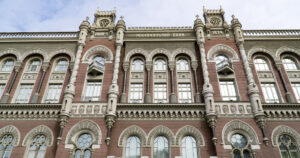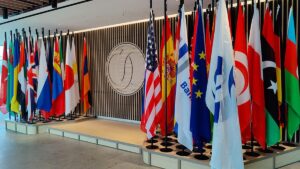
PJSC “National Energy Company (NEC) ”Ukrenergo“” On January 7 announced a tender for voluntary motor insurance (CASCO) services.
As reported in the system of electronic public procurement Prozorro, the expected cost of purchasing services is UAH 4.065 million.
The last day for submitting applications for participation is January 15.

According to Serbian Economist, the Serbian government has adopted a new resolution on financial support for domestic hoteliers, which provides, in particular, subsidies of up to €5 million for cooperation projects with international hotel brands.
The measure is aimed at improving the quality of hotel offerings and increasing tourism revenues, including by extending the tourist season.
Grants may be awarded to companies and entrepreneurs registered to operate in the hotel business and listed in the e-Turista system, as well as investors planning to build new facilities.
It is noted that in order to receive support, the applicant must have a franchise agreement with an international hotel chain or at least a letter of intent confirming future cooperation. The accommodation facility must be categorized as at least four stars. In the document, an international chain is defined as a legal entity that manages at least 50 hotels and operates in at least 10 countries on at least two continents.
The subsidy is provided on a non-repayable basis, with a maximum amount of €5 million per investment project. The list of eligible expenses includes franchise and branding fees, digital integration, and staff training. There is also a requirement that the property purchased with the support must be new, and the investor is obliged to ensure the continuous operation of the hotel in the declared category for at least five years from the date of opening.
Applications will be submitted after the announcement of a public selection process, and the decision on the allocation of funds will be made by a special working group based, in particular, on the business reputation and economic sustainability of the project. Recipients must regularly report to the relevant ministry on the use of funds and provide documentation prepared by an auditing company with professional liability insurance; if the conditions are violated, the state will be able to demand the return of funds with interest.

The European Bank for Reconstruction and Development (EBRD) has signed an agreement with PJSC Ukrhydroenergo to provide a €75 million loan to finance the project “Modernization and restoration of hydroelectric power plant generation facilities,” the company said.
“The loan financing is supported by a European Union guarantee under the Ukraine Investment Framework, an instrument for mobilizing financing for Ukraine’s recovery and long-term growth,” the company said in a statement on its Telegram channel on Thursday.
According to the statement, the financing package also includes investment grants from international donors amounting to EUR 20 million.
“The estimated total cost of the project, including Ukrhydroenergo’s own contribution, is approximately EUR 120 million,” the company concluded.
According to the chairman of the supervisory board, Valentin Gvozdiy, attracting EBRD financing under the EU guarantee is an important confirmation of the confidence of international partners in Ukrhydroenergo and the quality of the company’s corporate governance.
“The project will strengthen the reliability of hydroelectric power plants and, accordingly, the stability of Ukraine’s energy system,” he said.
As noted in the statement, the project funds are planned to be used, in particular, to purchase critically needed equipment for certain hydroelectric power plants of the company, such as hydraulic power equipment damaged as a result of Russia’s military aggression, hydromechanical equipment for modernization, and equipment for responding to emergencies in conditions of martial law (emergency assistance mechanism).
As noted by Bogdan Sukhetsky, acting director general of Ukrhydroenergo, the funding will enable the timely purchase and implementation of critically needed equipment, as well as the creation of a reserve for rapid response to emergencies.
“The availability of these funds is important for maintaining the continuous operation of the enterprise and fulfilling production tasks in difficult conditions,” he stressed.
The project also includes programs to improve the qualifications of engineering personnel, enhance ESG practices, and prepare an action plan for gender equality. The project is scheduled for completion in 2030.

The National Bank of Ukraine has imposed sanctions on Motor Bank, fining it UAH 3.0 million.
According to the regulator, the bank violated the requirements of the legislation in the field of preventing money laundering and terrorist financing, in particular, in terms of proper customer verification and the application of a risk-based approach.

In December 2025, Ukraine significantly increased its electricity imports – by 54% compared to the previous month, to 639.5 thousand MWh, which was the highest figure since July 2024, the DIXI Group analytical center reported on its website on Wednesday, citing data from Energy Map.
“The increase in imports occurred against the backdrop of a deterioration in the power grid due to massive attacks by the Russian Federation on energy infrastructure and seasonal growth in consumption,” the center said.
During December, Russia carried out four massive attacks, targeting electricity generation, transmission, and distribution facilities. In particular, the attacks on December 6 and 23 led to a forced reduction in the generation of nuclear power plants, which provide more than half of Ukraine’s total electricity production. An additional factor contributing to the increased load on the power system was a significant drop in air temperature throughout the country, which led to an increase in energy consumption.
According to Energy Map, the increase in supply volumes was usually recorded the day after or two days after the shelling, during a period of reduced available generation and growing power shortages. Thus, after the attack on December 6, imports increased to 21.3 thousand MWh on December 7 (+18%) and to 32.6 thousand MWh on December 8 (+81%). A similar trend was observed after other massive strikes that took place on December 13, 23, and 27.
In December, Hungary accounted for the largest share of imports – 41%. Slovakia accounted for 21%, Romania and Poland for 18% each, and Moldova for 2%.
In December, the maximum transmission capacity of inter-state crossings for electricity imports increased from 2.1 GW to 2.3 GW. On average, the available transmission capacity was used at 37.4% during the month.
“Thus, December 2025 was the third consecutive month that Ukraine ended as a net importer of electricity,” DIXI Group emphasized.
On the other hand, Ukraine did not export electricity in December. The last time zero export volumes were recorded was in August 2024.

The European Bank for Reconstruction and Development (EBRD) is providing OTP Leasing with an unsecured loan in local currency equivalent to up to EUR 20 million to support micro, small and medium-sized enterprises (MSMEs) affected by the Russian Federation’s war against Ukraine.
“The financing will help strengthen the competitiveness, resilience, and inclusiveness of Ukrainian MSMEs by expanding access to leasing products in conditions of liquidity shortages and heightened economic uncertainty,” the bank said in a statement on Wednesday following the signing of the necessary documents.
It is noted that 50% of the loan funds are planned to be directed to MSMEs for long-term investments in technologies that meet European Union (EU) standards, in particular “green” technologies, and the financing should enable enterprises to obtain transport, equipment, and machinery without significant initial capital expenditures at a time when liquidity remains limited due to war factors.
Upon completion of the investment projects, borrowers who meet the program criteria will receive EU-funded technical assistance and US-funded investment incentives under the EU4Business initiative.
Additional grants are available for businesses that have suffered destruction, loss of assets, or forced displacement, as well as for companies that promote the reintegration of veterans, persons with disabilities, and IDPs, and for MSMEs that have relocated or operate in affected regions, with support also extending to businesses led by women and young people.
The loan will be supported by an interest rate subsidy of up to 10% from the US through the EBRD’s SME Special Fund.
According to the EBRD, the company is its current client and a leading leasing company in Ukraine, providing financial leasing and fleet management services to corporate clients and MSMEs throughout the country.
Since the start of Russia’s full-scale war against Ukraine, the EBRD has raised more than EUR 9.1 billion for Ukraine, including EUR 3.3 billion through partner financial institutions.
OTP Leasing is a non-bank financial institution subsidiary of Hungary’s OTP Bank, which has been working with the EBRD for many years.
In the third quarter of 2025, the company’s revenue increased by 7.3% compared to the third quarter of 2024, to UAH 1 billion 242.3 million, while net profit almost doubled, to UAH 808.0 million.
EBRD, FINANCING, LOAN, OTP LEASING, SMES